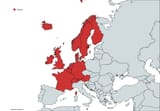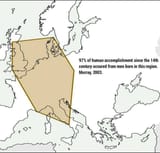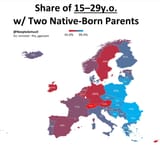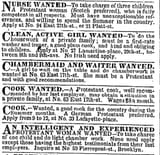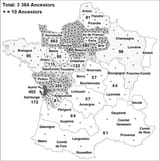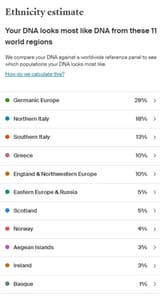>>518897811
The Battle of Jengland (also called Jengland-Beslé, Beslé, or Grand Fougeray) took place on 22 August 851, between the Frankish army of Charles the Bald and the Breton army of Erispoe, Duke of Brittany. The Bretons were victorious, leading to the signing of the Treaty of Angers in September 851 which secured Breton independence.
Background
In 845, Nominoë, Duke of Brittany, had defeated Charles the Bald at the Battle of Ballon. A truce had followed, but in 849 Nominoë resumed his offensive against the Franks. He sought to establish full personal control over his duchy and extend its territory. In 851, Frankish garrisons left in the previous year in Rennes and Nantes capitulated to Nominoë, who raided eastwards, ravaging Le Mans. Nominoë then decided to advance to Chartres, but died suddenly, near Vendôme. His successor, his son Erispoe, took command of the Breton force and continued its offensive in alliance with Lambert II of Nantes, a renegade Frank dispossessed by Charles the Bald.
Faced with the threat, Charles sought the support of his brother Louis the German, obtaining a contingent of Saxons to increase the size of his force. He marched to confront Erispoe, who retreated back to the borders of Brittany. Both leaders probably ledsmallish armies, with Charles commanding around 4,000 troops and Erispoe around 1,000.
 10/14/2025, 8:54:09 PM
No.518891906
>>518892040
>>518892205
>>518892333
>>518892353
>>518892512
>>518892683
>>518892906
>>518892908
>>518893140
>>518893191
>>518893214
>>518893417
>>518893436
>>518893812
>>518894095
>>518895095
>>518895656
>>518895945
>>518896199
>>518896250
>>518896416
>>518896957
>>518897059
>>518897232
>>518898534
>>518898980
>>518899174
>>518900604
>>518900668
>>518901089
>>518901669
>>518902345
>>518902491
>>518902813
>>518904776
>>518904899
>>518905008
>>518911356
10/14/2025, 8:54:09 PM
No.518891906
>>518892040
>>518892205
>>518892333
>>518892353
>>518892512
>>518892683
>>518892906
>>518892908
>>518893140
>>518893191
>>518893214
>>518893417
>>518893436
>>518893812
>>518894095
>>518895095
>>518895656
>>518895945
>>518896199
>>518896250
>>518896416
>>518896957
>>518897059
>>518897232
>>518898534
>>518898980
>>518899174
>>518900604
>>518900668
>>518901089
>>518901669
>>518902345
>>518902491
>>518902813
>>518904776
>>518904899
>>518905008
>>518911356
